A sample program demonstrating a small but powerful web server using the Wifly module. This uses several libraries from others, but has a custom version of the WiflyInterface library, with numerous improvement to the mbed standard library.
Dependencies: SW_HTTPServer WiflyInterface mbed C12832 IniManager
Here's the code
But you also might want to check out the SmartBoard-WiFly project page.
Basic Web Server
- Serves static files from the selected file system. This is a compile-time setting, and a typical configuration supports gif, jpg, jpeg, ico, png, zip, gz, tar, txt, pdf, htm, and html.
- It is designed to be small, thereby better supporting the limited resources of an embedded environment.
Advanced Web Services
- Serves dynamically generated pages, where your software registers for a path, and then everything to that path activates your handler. Your handler then defines the header and body response.
- Dynamic handlers can process GET query parameters (e.g. /dyn1?sky=blue&grass=green).
- Dynamic handlers can process POST query parameters, as delivered from submission of a form.
- Dynamic handlers can protect a resource with user:password access.
Run-Time Configurations
- File System Support - using either the "local" file system supported by the magic chip, or from either an SD-Card or a USB flash drive.
- Configurable to the maximum number of dynamic handlers (minimize memory requirements).
- Configurable to the maximum number of name=value pairs for dynamic handlers (minimize memory requirements).
Compile-Time Configurations
- Default filename for URL ending in '/' - default is 'index.htm'.
- Configurable buffer sizes permit minimizing RAM requirements.
- Configurable header response information.
- Configurable for which serial port is used to communicate to the WiFly module.
- Improved security option - to disable telnet access.
Diagnostics
- API to determine the largest header (to more efficiently size the buffers).
- API to gather the run-time characteristics - header processing time and content delivery time.
Limitations / Constraints
Known Issues
These are known issues, not yet resolved.
- Occasionally fails to serve a page - one test will constantly reload a web page every 30 seconds. It may run for hours, or minutes, then fail to load. Behaviors then are:
- Hit the reload button in the browser and away it goes.
- Hit the reload and you'll see the Wifly LEDs energize from the request, but no response by the web server. It appears that the embedded code does not "accept()" the connection in the TCP Socket Server.
- In this case, the Wifly module has gone through an internal watchdog reset and the configuration parameters are such that it does not gracefully recover. Microchip is aware of this issue, but has not solved it.
Wifly Limitations
- Single thread - it doesn't respond to overlapping requests (e.g. an embedded image may be requested before the main page completes transfer - the request is lost and the image not shown).
- Single client - goes along with the single thread, but it doesn't support more than one client at a time.
Smart-Wifly-WebServer
- Dynamic memory allocation - it does use dynamic memory allocation, which would be discouraged/avoided in many embedded systems. Here it uses it in parsing a request and it releases those resources upon completion of that request. If there is no other dynamic allocation that persists beyond a transaction, it should not cause memory fragmentation. Note that with multi-threading (if this is implemented with an OS), you then have race conditions that could cause fragmentation.
Web Server
Here's the web server in action. A combination of static pages served from the file system and dynamically generated pages.
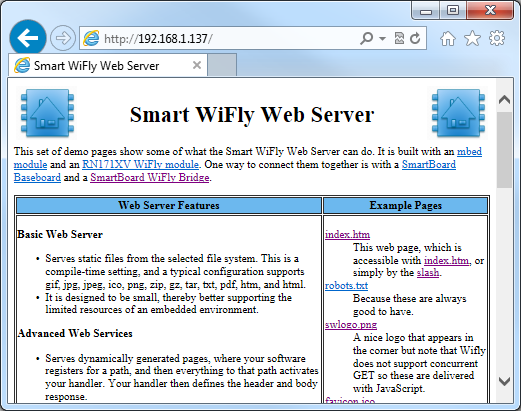 | Part of the main demo page, which basically has all the specifications, configurations, and limitations. |
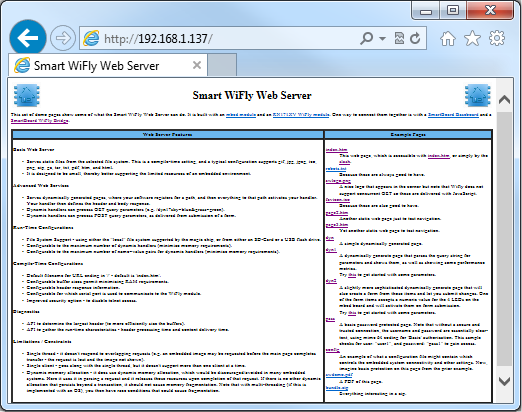 | A zoomed out view of the same page. |
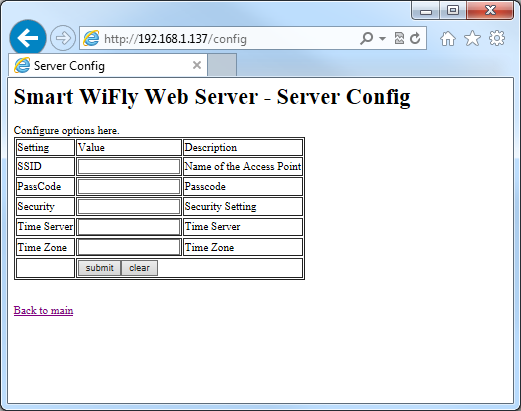 | It would be possible to configure the server via the web. |
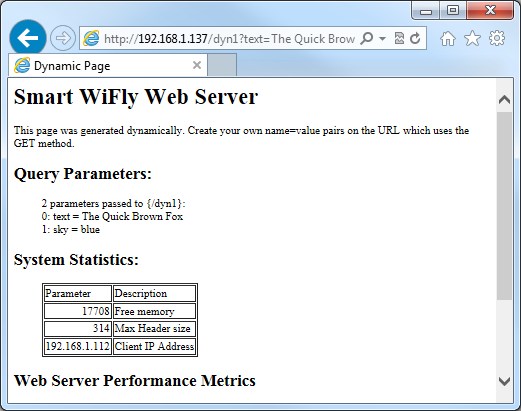 | One of the dynamically generated pages. This one has parsed the query parameters. |
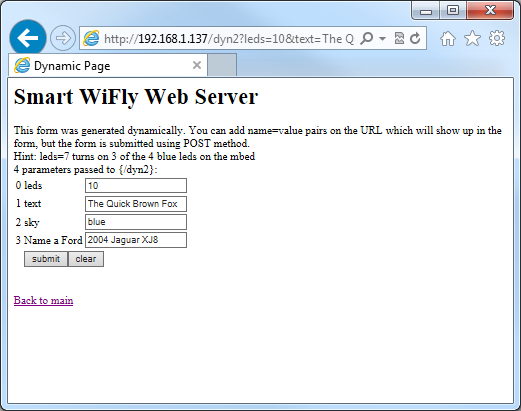 | A simple form which has a dynamic handler on the back end. Here it takes the value associated with "leds" and uses that to set the 4 LEDs on the mbed module. |
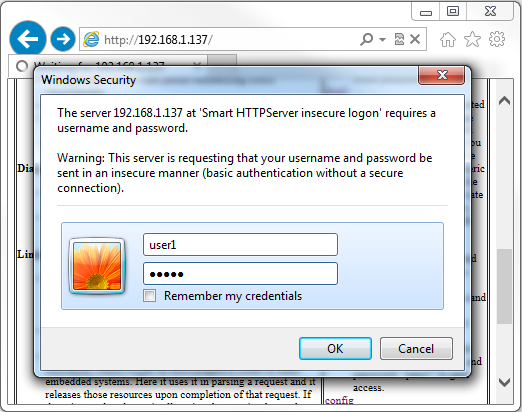 | A dynamic handler can require authentication. |
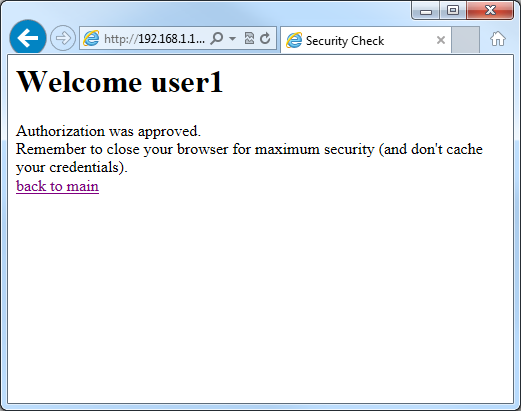 | Success! |
But I've now gone so far beyond that in the current version. Here's what this one can do:
- It serves static web pages from a file system. I've only tested with the local file system and an SD card, but should work for any, so long as you remember that the local file system can't read subdirectories.
- It can serve dynamically generated web pages. This lets you accept name=value pairs using the URL (using either a GET or POST method). It can also accept them from forms. The demo lets you control the 4 LEDs from a form.
- As safely as possible it retrieves your credentials to the Wi-Fi Access Point. After using them, it overwrites that ram so they can't be as easily extracted.
- I made a large number of changes to the Wifly driver. It had too short of a timeout and I found quite a number of optimizations for performance and robustness.
- I have the start on a security feature - you can configure a resource to require user credentials to access it. The browser typically provides a username and password dialog. Take care however, as it does not support a secure (https) connection, so the credentials are not as securely transferred as I would like.
Optimizations I'd like to do:
- speed it up - I'm running the mbed to wifly module interface at 230K, which is about the top speed w/o flow control. There are other places where some time delays remain - I have eliminated a number of them.
- make it non-blocking, so other work can happen.
- integrate it with the rtos
- When a web page has referenced resources (e.g. an image tag), it rarely loads the image on the first try. I think the request for the resource comes in while it is still in the WiflyInterface cleaning up from the last connection. The Wifly module supports only a single connection at a time. I worked around this with a small bit of javascript to load the images after the web page.
But all in all I think it is a good start.
Program prerequisite
Here's the link to the program, but when you open it up, note a few very important items.
- Port Numbers listed in the constructor match the SmartBoard Baseboard.
- I sped up the communication baud rate to the mbed from the default 9600. Match your terminal program accordingly.
- Download this zip. Place it and an unzipped copy into the mbed local file system. These are the demo files.
- The typical ssid and password are not shown. See below to set yours.
ssid and password
You need to create a simple text file on your mbed root folder named "config.ini". The easiest way perhaps is to create "config.txt", add the information shown below and then rename it. This will be read at startup to connect you to the network. Something quite simple, like this:
[Wifi] ssid=your_ssid pass=your_pass_code
The program
And the program.
Import programSmart-WiFly-WebServer
A sample program demonstrating a small but powerful web server using the Wifly module. This uses several libraries from others, but has a custom version of the WiflyInterface library, with numerous improvement to the mbed standard library.
Revision 34:77d0f63f612a, committed 2014-05-11
- Comitter:
- WiredHome
- Date:
- Sun May 11 21:20:00 2014 +0000
- Parent:
- 33:41ac99847df8
- Child:
- 37:8ced9a7fe3fd
- Commit message:
- Updated examples, particular focus on POST method.
Changed in this revision
--- a/Credentials.cpp Fri Jan 03 19:57:31 2014 +0000
+++ /dev/null Thu Jan 01 00:00:00 1970 +0000
@@ -1,50 +0,0 @@
-
-#include "mbed.h"
-#include "Credentials.h"
-
-/** Right Trim whitespace from the string.
-*
-* @param p is a pointer to the string to modify.
-*/
-/** Get amount of free memory.
-*
-* @returns number of bytes of unused memory on the heap.
-*/
-// trim the trailing \r\n
-static void RTrim(char *p) {
- while (*p >= ' ' && *p < 0x7F)
- p++;
- *p = '\0';
-}
-
-
-bool ReadCredentials(char * file, credentials * cr)
-{
- FILE *fp = fopen(file, "r");
-
- cr->ssid = (char *)malloc(SSID_SIZE);
- cr->pass = (char *)malloc(PASS_SIZE);
- if (fp) {
- fgets(cr->ssid, SSID_SIZE, fp); // Trusts that the sizes were not violated
- fgets(cr->pass, PASS_SIZE, fp);
- fclose(fp);
- RTrim(cr->ssid);
- RTrim(cr->pass);
- return true;
- } else {
- return false;
- }
-}
-
-void FreeCredentials(credentials * cr)
-{
- // first secure them by wiping them out
- for (int i=0; i<SSID_SIZE; i++)
- cr->ssid[i] = '*';
- for (int i=0; i<PASS_SIZE; i++)
- cr->pass[i] = '*';
-
- // then free the memory
- free(cr->ssid);
- free(cr->pass);
-}
--- a/Credentials.h Fri Jan 03 19:57:31 2014 +0000
+++ /dev/null Thu Jan 01 00:00:00 1970 +0000
@@ -1,42 +0,0 @@
-
-#ifndef CREDENTIALS_H
-#define CREDENTIALS_H
-#include "mbed.h"
-
-/// This section helps manage the credentials. I don't like the examples
-/// that show clear text credentials, even if they are simply the
-/// access point ssid and passphrase. So, I created this to let me
-/// edit a simple file on the file system and put them in there.
-/// Marginally more secure, but at least not in the source code that
-/// I might inadvertently share with others.
-///
-typedef struct {
- char * ssid;
- char * pass;
-} credentials;
-
-// Size changed (from 50 for both) to comply with WiFi Specifications
-#define SSID_SIZE 30
-#define PASS_SIZE 64
-
-/** Read credentials from a file.
-*
-* This reads a file constructed for hosting the credentials needed
-* to sign on to a WiFy access point.
-*
-* @param filename of interest that hosts the credentials.
-* @param cr is the credentials structure that is populated with the credentials.
-* @returns true if it successfully read the credentials, false otherwise.
-*/
-bool ReadCredentials(char * file, credentials * cr);
-
-/** Free the credentials structure to reduce ram usage.
-*
-* This will release the resources, but before it does so it will
-* wipe the memory, so the credentials are not left in memory.
-*
-* @param cr is the credentials structure.
-*/
-void FreeCredentials(credentials * cr);
-
-#endif // CREDENTIALS_H
\ No newline at end of file
--- /dev/null Thu Jan 01 00:00:00 1970 +0000
+++ b/Credentials/Credentials.cpp Sun May 11 21:20:00 2014 +0000
@@ -0,0 +1,50 @@
+
+#include "mbed.h"
+#include "Credentials.h"
+
+/** Right Trim whitespace from the string.
+*
+* @param p is a pointer to the string to modify.
+*/
+/** Get amount of free memory.
+*
+* @returns number of bytes of unused memory on the heap.
+*/
+// trim the trailing \r\n
+static void RTrim(char *p) {
+ while (*p >= ' ' && *p < 0x7F)
+ p++;
+ *p = '\0';
+}
+
+
+bool ReadCredentials(char * file, credentials * cr)
+{
+ FILE *fp = fopen(file, "r");
+
+ cr->ssid = (char *)malloc(SSID_SIZE);
+ cr->pass = (char *)malloc(PASS_SIZE);
+ if (fp) {
+ fgets(cr->ssid, SSID_SIZE, fp); // Trusts that the sizes were not violated
+ fgets(cr->pass, PASS_SIZE, fp);
+ fclose(fp);
+ RTrim(cr->ssid);
+ RTrim(cr->pass);
+ return true;
+ } else {
+ return false;
+ }
+}
+
+void FreeCredentials(credentials * cr)
+{
+ // first secure them by wiping them out
+ for (int i=0; i<SSID_SIZE; i++)
+ cr->ssid[i] = '*';
+ for (int i=0; i<PASS_SIZE; i++)
+ cr->pass[i] = '*';
+
+ // then free the memory
+ free(cr->ssid);
+ free(cr->pass);
+}
--- /dev/null Thu Jan 01 00:00:00 1970 +0000
+++ b/Credentials/Credentials.h Sun May 11 21:20:00 2014 +0000
@@ -0,0 +1,42 @@
+
+#ifndef CREDENTIALS_H
+#define CREDENTIALS_H
+#include "mbed.h"
+
+/// This section helps manage the credentials. I don't like the examples
+/// that show clear text credentials, even if they are simply the
+/// access point ssid and passphrase. So, I created this to let me
+/// edit a simple file on the file system and put them in there.
+/// Marginally more secure, but at least not in the source code that
+/// I might inadvertently share with others.
+///
+typedef struct {
+ char * ssid;
+ char * pass;
+} credentials;
+
+// Size changed (from 50 for both) to comply with WiFi Specifications
+#define SSID_SIZE 30
+#define PASS_SIZE 64
+
+/** Read credentials from a file.
+*
+* This reads a file constructed for hosting the credentials needed
+* to sign on to a WiFy access point.
+*
+* @param filename of interest that hosts the credentials.
+* @param cr is the credentials structure that is populated with the credentials.
+* @returns true if it successfully read the credentials, false otherwise.
+*/
+bool ReadCredentials(char * file, credentials * cr);
+
+/** Free the credentials structure to reduce ram usage.
+*
+* This will release the resources, but before it does so it will
+* wipe the memory, so the credentials are not left in memory.
+*
+* @param cr is the credentials structure.
+*/
+void FreeCredentials(credentials * cr);
+
+#endif // CREDENTIALS_H
\ No newline at end of file
--- a/Examples/DynamicFileIn.cpp Fri Jan 03 19:57:31 2014 +0000
+++ b/Examples/DynamicFileIn.cpp Sun May 11 21:20:00 2014 +0000
@@ -7,20 +7,26 @@
#define DEBUG "File"
#include "Utility.h"
-// This defines the size of the largest file you are willing to accept
-//
+// This defines the size of the largest file you are willing to accept.
+// Hopefully, space is also available on the file system for it.
#define ACCEPT_MAX_BYTES (25000)
-// This defines the local cache, which should be about 2 x the size of a single chunk hand-off
-// which is based on the size of an ethernet data frame (~1500 bytes). So 2 x 1500 is a good number.
+// This defines the local cache, which should be at least 2 x the size of ETHER_CHUNK.
+// It can be any size above that, so long as RAM is available.
+#define PCACHE_SIZE (3000)
+
+// ETHER_CHUNK is the maximum size of a single packet handoff.
#define ETHER_CHUNK (1500)
-#define PCACHE_SIZE (3000)
-#define MAX_BOUNDARY_LEN (150) // Seems very generous...
+#if ((2 * ETHER_CHUNK) > PCACHE_SIZE)
+#error "Configuration error, PCACHE_SIZE must be at least 2 * ETHER_CHUNK size.
+#endif
+
static int bytesInCache;
static char * pCache;
static char * boundary = ""; // for pointing at the boundary marker part of multipart/form-data in pCache
+static char * contenttype = NULL; // for "text/plain", or "image/bmp"
static char * fqfn = NULL; // for the filepath/filename
-static char * contenttype = NULL; // for "text/plain", or "image/bmp"
+static FILE * fp = NULL;
static int bytesWritten;
static int FileSize(const char * dir, const char * filename);
@@ -28,6 +34,7 @@
static int _strnicmp(const char * left, const char * right, int len);
static char * _stristr(char * pHaystack, const char * pNeedle);
static char * _strnbin(char * pBinstack, const char *pNeedle, int len);
+static void FreeResources(void);
typedef enum {
IDLE,
@@ -74,8 +81,13 @@
Seeking_ContentType,
Seeking_Data
} EF_State_E;
+ //const char * statelist[] = {
+ // "Start",
+ // "Filename",
+ // "ContentType",
+ // "Data"
+ //};
static EF_State_E EF_State = Seeking_Boundary_Start;
- static FILE * fp = NULL;
char * pDataStart = pCache; // start of data in this transaction
char * pDataEnd = pCache + bytesInCache; // end of data in this transaction
@@ -83,8 +95,10 @@
char *p1, *p2, *p3; // general purpose pointer for processing the results
HTTPServer::CallBackResults ret = HTTPServer::ACCEPT_CONTINUE;
+ //INFO("ProcessCache %s", statelist[EF_State]);
INFO("### Cache Begin\r\n%s\r\n### Cache End", pCache);
if (EF_State == Seeking_Boundary_Start) {
+ INFO("Start");
pDBLcrlf = _strnbin((char *)pDataStart, "\r\n\r\n", pDataEnd - pDataStart); // find end of preamble
if (pDBLcrlf) {
p1 = _strnbin((char *)pDataStart, boundary, pDBLcrlf - pDataStart); // is there a boundary in the cache?
@@ -95,6 +109,7 @@
}
if (EF_State == Seeking_Filename) {
+ INFO("File");
pDBLcrlf = _strnbin((char *)pDataStart, "\r\n\r\n", pDataEnd - pDataStart); // find end of preamble
if (pDBLcrlf) {
p2 = _strnbin((char *)pDataStart, "Content-Disposition: ", pDBLcrlf - pDataStart); // and the filename container?
@@ -127,6 +142,7 @@
}
if (EF_State == Seeking_ContentType) {
+ INFO("ContentType");
pDBLcrlf = _strnbin((char *)pDataStart, "\r\n\r\n", pDataEnd - pDataStart); // find end of preamble
if (pDBLcrlf) {
p2 = _strnbin((char *)pDataStart, "Content-Type: ", pDBLcrlf - pDataStart);
@@ -154,17 +170,13 @@
}
if (EF_State == Seeking_Data) {
+ INFO("Data");
if (!fp && fqfn) {
- //INFO("Open file [%s]", fqfn);
+ INFO("Open file [%s]", fqfn);
fp = fopen(fqfn, "w");
if (!fp) {
ERR("failed to open [%s]", fqfn);
- free(fqfn);
- fqfn = NULL;
- if (contenttype) {
- free(contenttype);
- contenttype = NULL;
- }
+ FreeResources();
ret = HTTPServer::ACCEPT_ERROR;
return ret;
}
@@ -216,24 +228,7 @@
}
if (type == HTTPServer::DATA_TRANSFER_END) {
- if (fp) {
- fclose(fp);
- fp = NULL;
- if (fqfn) {
- free(fqfn);
- fqfn = NULL;
- }
- if (contenttype) {
- free(contenttype);
- contenttype = NULL;
- }
- }
- if (pCache) {
- //INFO("pCache - freed");
- free(pCache);
- pCache = NULL;
- bytesInCache = 0;
- }
+ FreeResources();
ret = HTTPServer::ACCEPT_COMPLETE;
}
return ret;
@@ -295,6 +290,7 @@
case HTTPServer::DATA_TRANSFER_END:
//INFO("\r\n\\\\\\\\\\\\ Transfer Begin [%d, %d]\r\n%s\r\n////// Transfer End", count, bytesInCache, path);
+ INFO("TransferEnd [%d, %d, %d, %d]", count, bytesInCache, PCACHE_SIZE - ETHER_CHUNK, PCACHE_SIZE);
// if there is anything there, copy it in.
if (count) {
memcpy(pCache + bytesInCache, path, count);
@@ -307,22 +303,25 @@
case HTTPServer::DATA_TRANSFER:
//INFO("\r\n\\\\\\\\\\\\ Transfer Begin [%d, %d]\r\n%s\r\n////// Transfer End", count, bytesInCache, path);
// We chose to accept the transfer, and it may come in chunks.
- if (bytesInCache + count < PCACHE_SIZE - ETHER_CHUNK) { // room in the cache for more, juat accept it locally
+ if ((bytesInCache + count) < (PCACHE_SIZE - ETHER_CHUNK)) { // room in the cache for more, juat accept it locally
+ INFO("Transfer A [%d, %d, %d, %d]", count, bytesInCache, PCACHE_SIZE - ETHER_CHUNK, PCACHE_SIZE);
memcpy(pCache + bytesInCache, path, count);
bytesInCache += count;
pCache[bytesInCache] = '\0'; // one past the data, so ok (and good for debugging text streams)
ret = HTTPServer::ACCEPT_CONTINUE;
- } else if (bytesInCache + count < PCACHE_SIZE) { // room in the cache, now process it.
+ } else if ((bytesInCache + count) < PCACHE_SIZE) { // room in the cache, now process it.
+ INFO("Transfer B [%d, %d, %d, %d]", count, bytesInCache, PCACHE_SIZE - ETHER_CHUNK, PCACHE_SIZE);
memcpy(pCache + bytesInCache, path, count);
bytesInCache += count;
pCache[bytesInCache] = '\0'; // one past the data, so ok (and good for debugging text streams)
ret = ProcessCache(svr, type); // now hand it off
} else {
+ INFO("Transfer C [%d, %d, %d, %d]", count, bytesInCache, PCACHE_SIZE - ETHER_CHUNK, PCACHE_SIZE);
ret = ProcessCache(svr, type); // panic, ah!, ok, first hand it off then cache it
memcpy(pCache + bytesInCache, path, count);
bytesInCache += count;
pCache[bytesInCache] = '\0'; // one past the data, so ok (and good for debugging text streams)
- ERR("FATAL - didn't flush pCache, was about to be overrun");
+ ERR("FATAL - didn't flush pCache, %d in cache.", bytesInCache);
break;
}
break;
@@ -388,6 +387,27 @@
return ret;
}
+static void FreeResources(void)
+{
+ if (fp) {
+ fclose(fp);
+ fp = NULL;
+ }
+ if (fqfn) {
+ free(fqfn);
+ fqfn = NULL;
+ }
+ if (contenttype) {
+ free(contenttype);
+ contenttype = NULL;
+ }
+ if (pCache) {
+ free(pCache);
+ pCache = NULL;
+ bytesInCache = 0;
+ }
+}
+
static int FileSize(const char * dir, const char * filename)
{
int size = 0;
@@ -402,6 +422,7 @@
size = ftell(f);
fclose(f);
}
+ free(fqfn);
}
return size;
}
--- a/Examples/DynamicPages.cpp Fri Jan 03 19:57:31 2014 +0000
+++ b/Examples/DynamicPages.cpp Sun May 11 21:20:00 2014 +0000
@@ -7,11 +7,15 @@
#include "SW_HTTPServer.h"
#include "DynamicPages.h"
+
+//#define DEBUG "DYN_"
#include "Utility.h"
BusOut leds(LED4,LED3,LED2,LED1); // dynamic page "/dyn2" lets you control these
+static char * pPath = NULL;
+
/// SimplyDynamicPage1
///
@@ -20,7 +24,8 @@
///
/// You can see in main how this page was registered.
///
-HTTPServer::CallBackResults SuperSimpleDynamicPage(HTTPServer *svr, HTTPServer::CallBackType type, const char * path, const HTTPServer::namevalue *params, int paramcount)
+HTTPServer::CallBackResults SuperSimpleDynamicPage(HTTPServer *svr, HTTPServer::CallBackType type,
+ const char * path, const HTTPServer::namevalue *params, int paramcount)
{
HTTPServer::CallBackResults ret = HTTPServer::ACCEPT_ERROR;
char contentlen[30];
@@ -73,12 +78,14 @@
///
/// You can see in main how this page was registered.
///
-HTTPServer::CallBackResults SimpleDynamicPage(HTTPServer *svr, HTTPServer::CallBackType type, const char * path, const HTTPServer::namevalue *params, int paramcount)
+HTTPServer::CallBackResults SimpleDynamicPage(HTTPServer *svr, HTTPServer::CallBackType type,
+ const char * path, const HTTPServer::namevalue *params, int paramcount)
{
static unsigned int pageCounter = 0;
char buf[100];
HTTPServer::CallBackResults ret = HTTPServer::ACCEPT_ERROR;
HTTPServer::SW_PerformanceData perfData;
+ Wifly * w = svr->GetWifly()->getInstance();
switch (type) {
case HTTPServer::SEND_PAGE:
@@ -117,9 +124,9 @@
svr->send(buf);
sprintf(buf,"<tr><td align='right'>%d</td><td>Max Header size</td></tr>\r\n", svr->GetMaxHeaderSize());
svr->send(buf);
- sprintf(buf,"<tr><td align='right'>%3.2f</td><td>Wifly SW version</td></tr>\r\n", svr->GetWifly()->getWiflyVersion());
+ sprintf(buf,"<tr><td align='right'>%3.2f</td><td>Wifly SW version</td></tr>\r\n", w->getWiflyVersion());
svr->send(buf);
- sprintf(buf,"<tr><td align='right'>%s</td><td>Wifly Version Information</td></tr>\r\n", svr->GetWifly()->getWiflyVersionString());
+ sprintf(buf,"<tr><td align='right'><font size='-1'>%s</font></td><td>Wifly Version Information</td></tr>\r\n", w->getWiflyVersionString());
svr->send(buf);
svr->send("</table>\r\n");
svr->send("</blockquote>\r\n");
@@ -190,53 +197,95 @@
///
/// You can see in main how this page was registered.
///
-HTTPServer::CallBackResults SimpleDynamicForm(HTTPServer *svr, HTTPServer::CallBackType type, const char * path, const HTTPServer::namevalue *params, int paramcount)
+HTTPServer::CallBackResults SimpleDynamicForm(HTTPServer *svr, HTTPServer::CallBackType type,
+ const char * path, const HTTPServer::namevalue *params, int paramcount)
{
char buf[100];
+ int iPP = 0;
HTTPServer::CallBackResults ret = HTTPServer::ACCEPT_ERROR;
+ INFO("SimpleDynamicForm('', %d, %s, '', %d)", type, path, paramcount);
switch (type) {
case HTTPServer::SEND_PAGE:
+ INFO("send page");
// set the LEDs based on a passed in parameter.
- leds = atoi(svr->GetParameter("leds"));
+ if (pPath) {
+ INFO("Parse(%s)", pPath);
+ iPP = svr->ParseParameters((char *)pPath);
+ } else {
+ INFO(" no pPath");
+ }
+ if (svr->GetParameter("leds")) {
+ leds = atoi(svr->GetParameter("leds"));
+ }
// send the header
svr->header(200, "OK", svr->GetSupportedType(".htm")); //svr->header(200, "OK", "Content-Type: text/html\r\n");
// send some data
svr->send("<html><head><title>Dynamic Page</title></head>\r\n");
svr->send("<body>\r\n");
svr->send("<h1>Smart WiFly Web Server</h1>\r\n");
- svr->send("This form was generated dynamically. You can add name=value pairs on the URL "
- "which will show up in the form, but the form is submitted using POST method.<br/>\r\n");
- svr->send("Hint: leds=7 turns on 3 of the 4 blue leds on the mbed<br/>\r\n");
- sprintf(buf, "%d parameters passed to {%s}:<br/>\r\n", paramcount, path);
- svr->send(buf);
- // Create a user form for which they can post changes
- sprintf(buf, "<form method='post' action='%s'>\r\n", path);
- //sprintf(buf, "<form method='post' enctype='multipart/form-data' action='%s'>\r\n", path); // not supported
+ svr->send("These forms were generated dynamically. You can add name=value pairs on the URL "
+ "which will show up in the forms. Try both the POST and GET methods. \r\n");
+ svr->send("Hint: <a href='?leds=7&car=jag&sky=blue'>?leds=7&car=jag&sky=blue</a>"
+ " turns on 3 of the 4 blue leds on the mbed.<br/>\r\n");
+ sprintf(buf, "%d GET parameters passed to {%s}:<br/>\r\n", paramcount, path);
svr->send(buf);
- // show the parameters in a nice format
- svr->send("<table>\r\n");
- for (int i=0; i<paramcount; i++) {
- if (strcmp(params[i].name, "InFile") == 0)
- continue;
- sprintf(buf, "<tr><td>%d</td><td>%s</td><td><input type='text' name='%s' value='%s'></td></tr>\r\n", i, params[i].name, params[i].name, params[i].value);
+
+ svr->send("<table><tr><td><b>Post Form</b></td><td><b>Get Form</b></td></tr>\r\n");
+ svr->send("<tr>");
+
+ if (iPP && paramcount == 0)
+ paramcount = iPP;
+ for (int i=0; i<2; i++) {
+ // each form Post : Get
+ sprintf(buf, "<td><form method='%s' action='%s'>\r\n", (i==0) ? "Post" : "Get", path);
+ //sprintf(buf, "<form method='post' enctype='multipart/form-data' action='%s'>\r\n", path); // not supported
svr->send(buf);
+ // show the parameters in a nice format
+ svr->send("<table>\r\n");
+ for (int i=0; i<paramcount; i++) {
+ sprintf(buf, "<tr><td>%d</td><td>%s</td><td><input type='text' name='%s' value='%s'></td></tr>\r\n", i, params[i].name, params[i].name, params[i].value);
+ svr->send(buf);
+ }
+ svr->send("<tr><td colspan='2'> </td><td><input type='submit' value='submit'><input type='reset' value='clear'>"
+ " <a href='/'>Back to main</a></td></tr>\r\n");
+ svr->send("</table>\r\n");
+ svr->send("</form></td>\r\n");
}
- //svr->send("<tr><td> </td><td>File</td><td><input type='file' name='InFile' size='40'></td></tr>\r\n");
- svr->send("<tr><td> </td><td colspan='2'><input type='submit' value='submit'><input type='reset' value='clear'></td></tr>\r\n");
- svr->send("</table>\r\n");
- svr->send("</form>\r\n");
+ svr->send("</tr></table>\r\n");
+
// see how we're doing with free memory
- svr->send("<br/><a href='/'>Back to main</a></body></html>\r\n");
+ svr->send("</body></html>\r\n");
+ if (pPath) {
+ free(pPath);
+ pPath = NULL;
+ }
ret = HTTPServer::ACCEPT_COMPLETE;
break;
case HTTPServer::CONTENT_LENGTH_REQUEST:
+ INFO("cont len req");
ret = HTTPServer::ACCEPT_COMPLETE;
break;
case HTTPServer::DATA_TRANSFER:
+ INFO("data transfer");
+ pPath = (char *)malloc(strlen(path));
+ if (pPath) {
+ strcpy(pPath, path);
+ INFO(" pPath %s", pPath);
+ }
+ INFO(" dt exit.");
+ ret = HTTPServer::ACCEPT_COMPLETE;
+ break;
+ case HTTPServer::DATA_TRANSFER_END:
+ INFO("data transfer end");
ret = HTTPServer::ACCEPT_COMPLETE;
break;
default:
+ INFO("error");
+ if (pPath) {
+ free(pPath);
+ pPath = NULL;
+ }
ret = HTTPServer::ACCEPT_ERROR;
break;
}
--- a/FileSystem.lib Fri Jan 03 19:57:31 2014 +0000 +++ b/FileSystem.lib Sun May 11 21:20:00 2014 +0000 @@ -1,1 +1,1 @@ -http://mbed.org/users/WiredHome/code/FileSystem/#19a776ced714 +http://mbed.org/users/WiredHome/code/FileSystem/#c205a5ec7c54
--- a/IniManager.lib Fri Jan 03 19:57:31 2014 +0000 +++ b/IniManager.lib Sun May 11 21:20:00 2014 +0000 @@ -1,1 +1,1 @@ -http://mbed.org/users/WiredHome/code/IniManager/#64fcaf06b012 +http://mbed.org/users/WiredHome/code/IniManager/#cd28ab597256
--- a/MODSERIAL.lib Fri Jan 03 19:57:31 2014 +0000 +++ /dev/null Thu Jan 01 00:00:00 1970 +0000 @@ -1,1 +0,0 @@ -http://mbed.org/users/Sissors/code/MODSERIAL/#f42def64c4ee
--- a/SW_HTTPServer.lib Fri Jan 03 19:57:31 2014 +0000 +++ b/SW_HTTPServer.lib Sun May 11 21:20:00 2014 +0000 @@ -1,1 +1,1 @@ -http://mbed.org/users/WiredHome/code/SW_HTTPServer/#ef165a67ab22 +http://mbed.org/users/WiredHome/code/SW_HTTPServer/#0cb2774e2410
--- a/WiflyInterface.lib Fri Jan 03 19:57:31 2014 +0000 +++ b/WiflyInterface.lib Sun May 11 21:20:00 2014 +0000 @@ -1,1 +1,1 @@ -http://mbed.org/users/WiredHome/code/WiflyInterface/#0729959263b7 +http://mbed.org/users/WiredHome/code/WiflyInterface/#a4064f7e3529
--- a/main.cpp Fri Jan 03 19:57:31 2014 +0000
+++ b/main.cpp Sun May 11 21:20:00 2014 +0000
@@ -1,10 +1,8 @@
/** @file main.cpp contains the main program that a user would write.
* see the documentation above "main"
*/
-#include "mbed.h" // ver 75
-
-// Standard components
-#include "MODSERIAL.h" // ver 32 of Erik Olieman's derivative from Andy Kircham
+#include "mbed.h" // ver 83
+#include "RawSerial.h"
// My components
#include "Utility.h" // a couple of simple helper functions
@@ -18,19 +16,20 @@
#include "MSCFileSystem.h" // ver 1, this and SDFileSystem
#include "SDFileSystem.h" // ver 1, this and MSCFileSystem
+#define MBED_APP_BOARD 1 /* http://mbed.org/components/mbed-Application-Board/ */
+#define SMART_BOARD 2 /* http://mbed.org/users/WiredHome/notebook/SmartBoard-baseboard/ */
+
+#define HW_ADAPTER SMART_BOARD /* Which board are we compiling against? */
+
+
#define HTTP_SERVER_PORT 80
-#ifdef MODSERIAL_H
-MODSERIAL pc(USBTX, USBRX, "modser");
-#else
-Serial pc(USBTX, USBRX);
-#endif
-
+RawSerial pc(USBTX, USBRX);
LocalFileSystem local("local"); // some place to hold settings and maybe the static web pages
MSCFileSystem msc("msc"); // Mass Storage on USB
SDFileSystem sd(p5, p6, p7, p8, "sd"); // for the static web pages
-#define WEBROOT "/msc/web"
+#define WEBROOT "/local"
PwmOut signOfLife(LED1);
@@ -157,8 +156,8 @@
{
credentials cr; // handles the credentials
- pc.baud(921600); // I like a snappy terminal, so crank it up!
- pc.claim(); // capture stdout
+ pc.baud(460800); // I like a snappy terminal, so crank it up!
+ //pc.claim(); // capture stdout
pc.printf("\r\nSmart WiFly - Build " __DATE__ " " __TIME__ "\r\n");
if (!ReadCredentials("/local/user.crd", &cr)) {
@@ -167,14 +166,19 @@
error(" Waiting for user to fix this problem. \r\n"); // flash and die
}
- WiflyInterface wifly(p28, p27, p23, p24, cr.ssid, cr.pass, WPA); // Instantiate the WiflyInterface
+ // first signals are tx, rx, reset, status pins.
+ #if HW_ADAPTER == MBED_APP_BOARD
+ WiflyInterface wifly( p9, p10, p30, p29, cr.ssid, cr.pass, WPA);
+ #elif HW_ADAPTER == SMART_BOARD
+ WiflyInterface wifly(p28, p27, p23, p24, cr.ssid, cr.pass, WPA);
+ #endif
FreeCredentials(&cr); // Release the credentials, which also secures them
// Bring the WiFly interface online
do {
wifly.init(); // start it up as a client of my network using DHCP
- wifly.baud(921600); // Only 230K w/o HW flow control
- if (wifly.connect())
+ wifly.baud(230400); // Only 230K w/o HW flow control
+ if (0 == wifly.connect())
break;
pc.printf(" Failed to connect, retrying...\r\n");
wait(1.0);
--- a/mbed.bld Fri Jan 03 19:57:31 2014 +0000 +++ b/mbed.bld Sun May 11 21:20:00 2014 +0000 @@ -1,1 +1,1 @@ -http://mbed.org/users/mbed_official/code/mbed/builds/dc225afb6914 \ No newline at end of file +http://mbed.org/users/mbed_official/code/mbed/builds/8a40adfe8776 \ No newline at end of file
